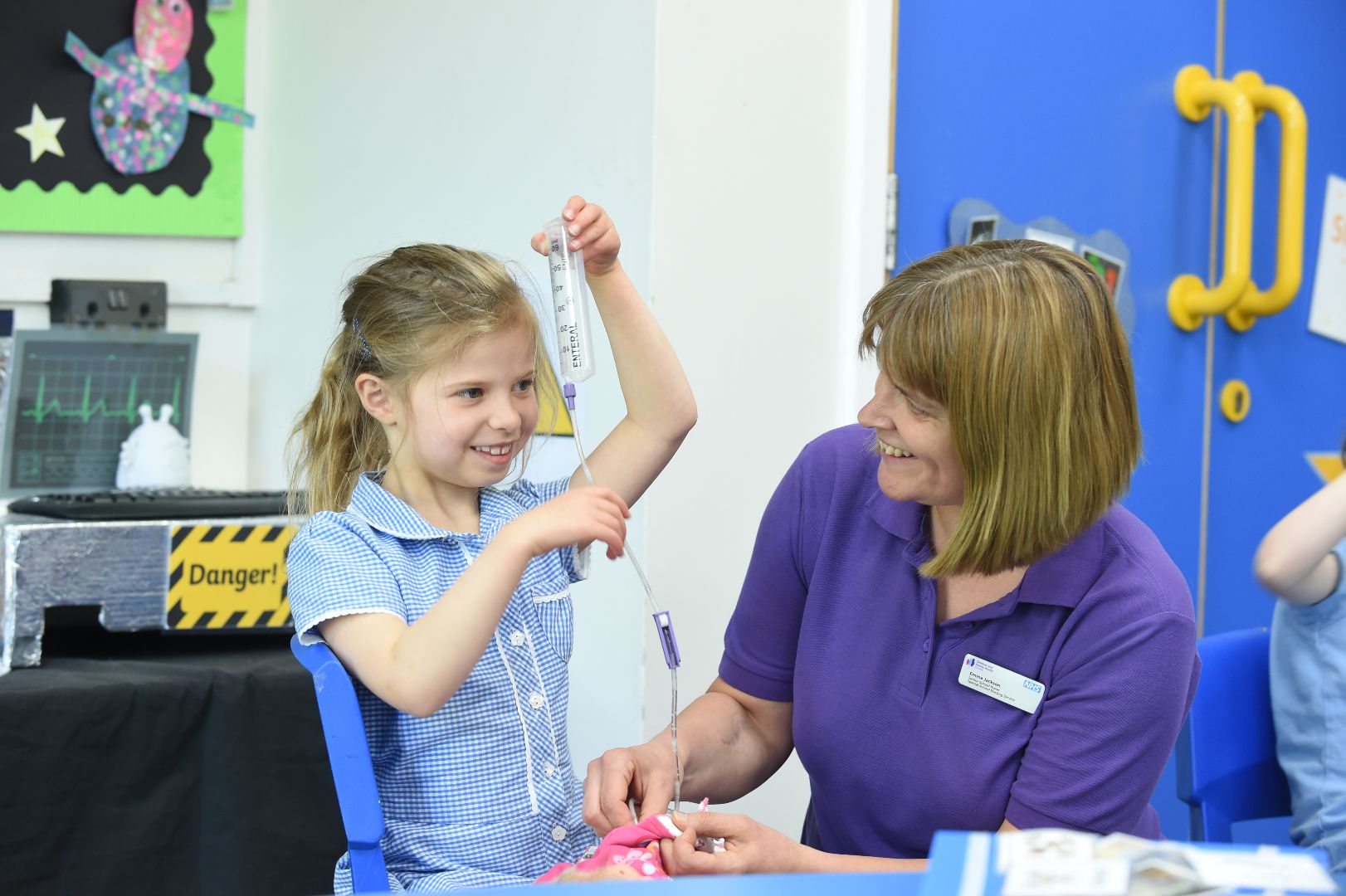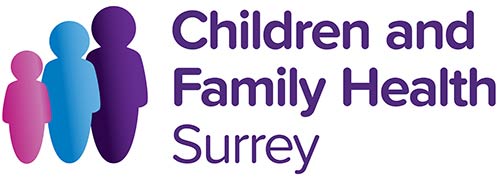Our Specialist School Nursing Teams are based in the eight Severe Learning Disability (SLD) Specialist Schools across Surrey, covering nursery to 19 years.
The Registered Nurses and Assistant Practitioners in the school teams work closely with pupils, parents, carers, teaching staff and a wide range of other professionals to identify the pupils’ health needs and provide agreed care plans.
The teams are an integral part of the school community and provide training and support for the school staff to meet the individual health needs of the children and young people. This enables all students to fully access their education and reach their potential, regardless of the complexity of their health needs.
- Providing holistic care for all students
- Safeguarding children and young people
- Providing individual assessment and care planning to meet each child’s needs
- Training for support staff in specific care procedures including: Enteral Feeding, Tracheostomy Care, Mechanical Ventilation, Epilepsy Awareness, Medicine Administration, Anaphylaxis, Oxygen Administration, Asthma Care
- Managing medicine storage and administration in school
- Enabling children and young people with severe learning and physical disabilities and / or life limiting conditions, to attend a locally maintained school
- Working in partnership with other agencies including: General Practitioners, Speech and Language Therapists, Occupational Therapists, Physiotherapists, Learning Disability Nurses, Hospital and Community Consultants, Community Children’s Nurses, Complex Health Needs Team, Specialist Nurses, Respite Facilities, Dieticians and Social Care
- Health promotion and promoting positive health choices
- Acting as an advocate for the child and family
- Providing support and advice for parents (open access)
- Providing nurse-led Down Syndrome clinics in schools
- Sign-posting and referral to appropriate services
- Acting as the lead health professional for the child by attending and contributing to a range of meetings including; Safeguarding, Child in Need, Looked After Child, Team Around a Child, Annual Educational Reviews, contributing to EHCP’s and supporting Transition to post-19 services
- Managing medical emergencies (over and above first aid) occurring at school
- Providing continence advice and assessment
- Providing learning placements and mentorship for student nurses from The University of Surrey.
Sleep is so important for all our mental, emotional and physical wellbeing.
Sleep problems can be more common and complex if a child or young person has a learning disability.
New webpage coming soon with tips, advice and information.
Information about a continence assessment, why and when it may be needed
The 0-19 teams and Special School Nursing team are here to provide support and advice to help your child/young person reach their full continence potential. The team will explore the common causes of incontinence, complete a continence assessment if required and may give you containment products.
Common causes of incontinence
- Fluid intake: if your child/young person doesn’t drink enough, their bladder will not learn to stretch and expand to hold wee and they may feel they need to wee often. Encourage your child/young person to have regular drinks (6-8 drinks) throughout the day and offer the toilet 20-30 minutes after drinking.
- Bladder and bowel infection: any infection in the bowel or urinary tract can have an effect on toilet training, causing a more frequent need to wee or poo.
- Constipation and diarrhoea: constipation (hard, infrequent stooling or soiling) is the most common cause of urinary incontinence in children as a full bowel presses on the bladder causing incontinence.
What happens during a continence assessment?
For a continence assessment to take place, we need:
- A questionnaire
- A three day intake/output chart. The intake/output chart is a tool used to track how much fluid is drunk and how often the child/young person wees.
The completed questionnaire and chart is reviewed by the team to find any problems such as amount of fluid intake or constipation. The team will offer basic advice on things like toilet training and fluid intake.
After the assessment, the team may advise a toilet training program if we feel continence can be achieved. If the assessment shows a need for containment products, the child/young person will be measured to ensure correct fit and absorbency.
Containment products
If containment products are prescribed, the continence service will send samples for your child/young person to try. You will then need to contact the Daytime Enuresis team on 07713 094 697 to confirm the products are suitable. These will be delivered every 12 weeks.
What happens next?
If you have concerns around your child/young person’s continence, please contact your Special School Nursing team or the 0-19 team through the One Stop Referral Service on 0300 222 5755.
Further information
For more information about bladder and bowel issues, visit Bladder and Bowel UK Disabled Living’s website at www.bladderandboweluk.co.uk and ERIC’s website at www.eric.org.uk
These services may vary between schools:
- Consultant paediatrician clinics
- Outreach Epilepsy clinics
- Audiology clinics
- Dental checks
- Vision testing
- Parent workshops
- Immunisations
- Dietician clinics (Gastrostomy)
Our service includes the following specialist schools.
Please note that emails and phone lines are monitored from 8.30am to 4.00pm Monday to Friday, term time only.
Brooklands (nursery and primary, Reigate)
Telephone 01737 224 552
Email csh.nursebrookland@nhs.net
Clifton Hill (secondary and further education, Caterham)
Telephone 01883 345 950
Email csh.cliftonhill@nhs.net
Manor Mead (nursery and primary school, Shepperton)
Telephone 01932 244 284
Email csh.manormeadnurses@nhs.net
Pond Meadow (nursery, primary, secondary and further education, Guildford
Telephone 01483 477 337
Email csh.pmnt@nhs.net
Portesbery (nursery, primary, secondary and further education, Camberley)
Telephone 01252 832 104
Email csh.portesbery@nhs.net
The Ridgeway (nursery, primary, secondary and further education, Farnham)
Telephone 01252 724 562
Email csh.ridgewaysch@nhs.net
Walton Leigh (secondary school, and further education, Walton)
Telephone 01932 222 593
Email csh.waltonleighnursingteam@nhs.net
Woodlands (nursery, primary and secondary, Leatherhead)
Telephone 01372 377 922
Email csh.woodlandsnurseteam@nhs.net
Clinical Team Leader: 07970 939 105
Once your child has accepted a place at one of the above schools, their details will be passed to the special school nursing team based within the chosen school.
The team will make contact with the parents or carers and arrange a health assessment meeting.
This meeting may take place at school, or within the home, with just the nursing team, or as a joint visit with the teaching staff. The purpose of the meeting is to gather information about your child’s health, to enable the team to write care plans and provide school staff training, which in turn will result in a smooth transition into school, ensuring all health needs are met from the start.
All children who attend one of the above schools will have automatic access to the service.


